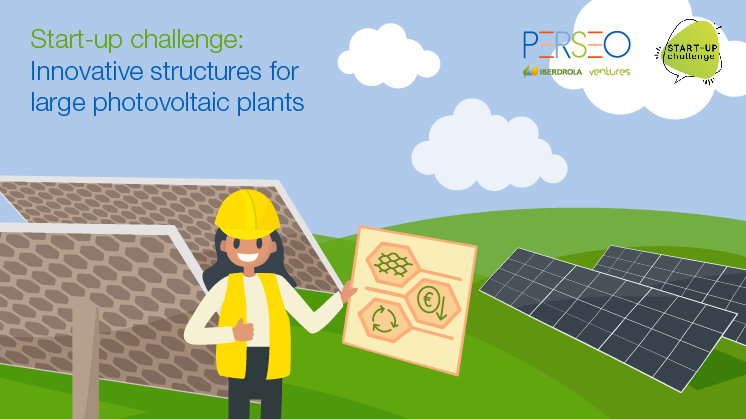'Start-up challenge': Innovative structures for large-scale photovoltaic plants
Five solutions to optimise the costs of large photovoltaic plants
Five companies have been selected in the search for sustainable structures that allow cost optimisation either because they are made of alternative materials to steel or because their ratio of steel per MW built is lower than that of conventional structures.

The Start-up Challenge, which sought innovative structures for photovoltaic plants, has been resolved with five winners. This challenge, launched by Iberdrola - through its PERSEO start-up programme - sought to optimise the manufacture of photovoltaic plants through new sustainable structures that would allow cost optimisation, either because they are made of alternative materials to steel or because their ratio of steel per MW built is lower than that of conventional structures.
Finally, five suppliers of photovoltaic structures have been selected as winners; one Australian company, three Spanish companies and another of Indian origin, but also with an office in the United States. The five chosen solutions are:
5B Maverick - 5B - Solar Reinvented
The Australian clean-tech company 5B has developed a ground-mount solar solution called 5B Maverick - designed to be safer, more cost effective and faster to deploy, and it requires much less land to install the same power than traditional solutions. It is a pre-assembled modular structure, which allows it to be transported in standard shipping containers or flatbed trucks and installed onsite very quickly (plug & play).
PV Hardware - Intelligence beyond steel - PVH Advanced solar tracking solutions
PV Hardware is a Spanish manufacturer of fixed structures, solar trackers and control solutions for large-scale photovoltaic plants, having supplied 20 GW of photovoltaic structures so far. For the challenge, PV Hardware has designed a new structure, Solar Fix 1H, made of composite material, which is characterised by its easy deployment and adaptability to the terrain.
SunSeed APV
SunSeed APV is an Indian start up, with an office in the US as well. They have developed innovative structures for both photovoltaic and agrovoltaic projects. Its proposal consists of a photovoltaic structure supported on steel cables. SunSeed’s cable structures are 10-15 % lighter and have 25-30 % less foundations compared to conventional structures. Additionally, installation times are shortened, and the flexibility of the steel cables allows for seamless installation on undulating terrain, avoiding costly earth movements.
Birka - BIRKA · Composites Group
BIRKA COMPOSITES, is a Spanish company, whose main activity is the manufacture of profiles in composite materials. Birka has developed and patented its own system for the manufacture of continuous profiles (Dual Pull Braiding), whose main advantage is the substantial increase in the mechanical properties of the profiles, compared to those obtained through other traditional methods of manufacturing composite materials. The company has designed a fixed structure with a 3V configuration supported by polyester profiles reinforced with fibreglass.
Solarbloc ® - Pretensados Durán
Pretensados Durán is a Spanish company that manufactures prefabricated concrete structures. For the renewable energy sector, they have designed a structure called SOLARBLOC®, whose main advantages are speed of installation, independence from the price of steel, durability and resistance to chemical and atmospheric agents.
The collaboration between these five companies and Iberdrola will consist of a comparative technical-economic feasibility study of the five solutions for a project in Spain. This study aims to demonstrate that these innovative solutions can be cost competitive compared to conventional solutions and reduce dependence on steel.
Context
In line with its commitment to the fight against climate change, the Iberdrola group is committed to renewable energies to advance towards energy transition and the necessary decarbonisation and electrification of the economy. The group plans to invest 150 billion euros by 2030, which would increase its installed capacity to 95 GW by the end of this decade.
Solar photovoltaic generation is one of Iberdrola's main pillars of growth. Therefore, in 2021, almost 1,200 MW of new solar capacity was installed, contributing to approximately 35 GW of installed renewable capacity worldwide. Iberdrola also has the largest operational photovoltaic plant in Europe - Núñez de Balboa (Badajoz), with 500 MWp - and is currently building the Francisco Pizarro plant, which is located in Cáceres and will have a capacity of 590 MWp.
Description of the challenge
In recent years, the prices of steel and other inputs have undergone an upward trend that affects the profitability of photovoltaic plants. In this context, Iberdrola, through its International Start-up Programme - PERSEO, is looking for new innovative structures for photovoltaic plants that allow cost optimisation, either because they are manufactured with alternative materials to steel or because their ratio of steel per MW built is lower than that of conventional structures.
Solutions are sought for large-scale photovoltaic plants, which are usually located on rural land. Proposals to be considered could include, among others:
-
Structures made from new materials and/or new lower-cost designs.
-
Structures made of materials in line with circular economy models: recycled, recyclable, therefore sustainable and environmentally friendly.
-
Structures with a lower ratio of steel per MW installed.
Also an asset:
-
The maturity and reliability of the solution.
-
Simplicity of installation and maintenance.
-
Investment and operating costs.
-
Scalability of the solution for this and other applications in the electricity sector (generation and transmission - networks).
-
Structures that optimise the installation process in terms of time or cost.
-
Structures manufactured using manufacturing methods that reduce the emissions associated with the process, or the use of materials.
-
 The positive impact in any of the Just Transition areas (i.e.: Lada y Velilla del Rio Carrión).
The positive impact in any of the Just Transition areas (i.e.: Lada y Velilla del Rio Carrión).
The deadline for registration was between 1 March and 8 April 2022. The winner was announced in May 2022.




